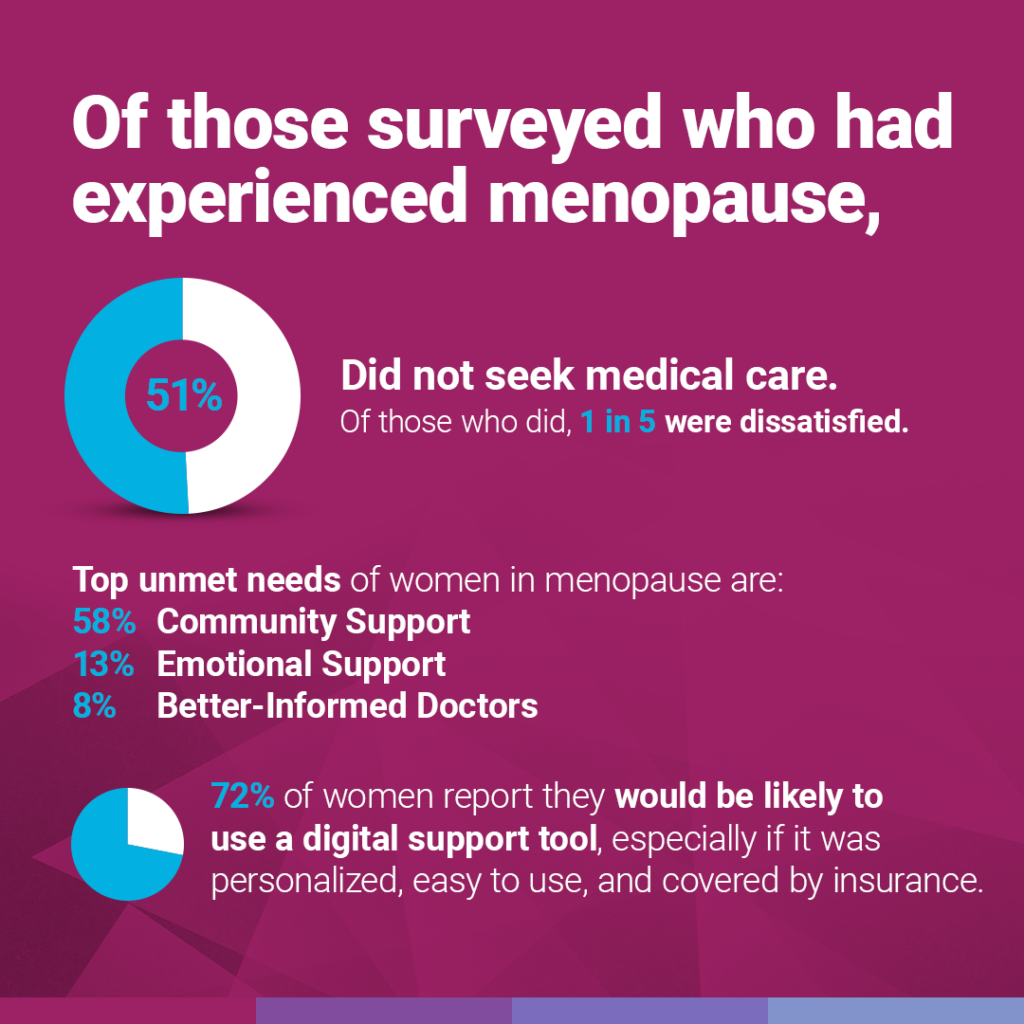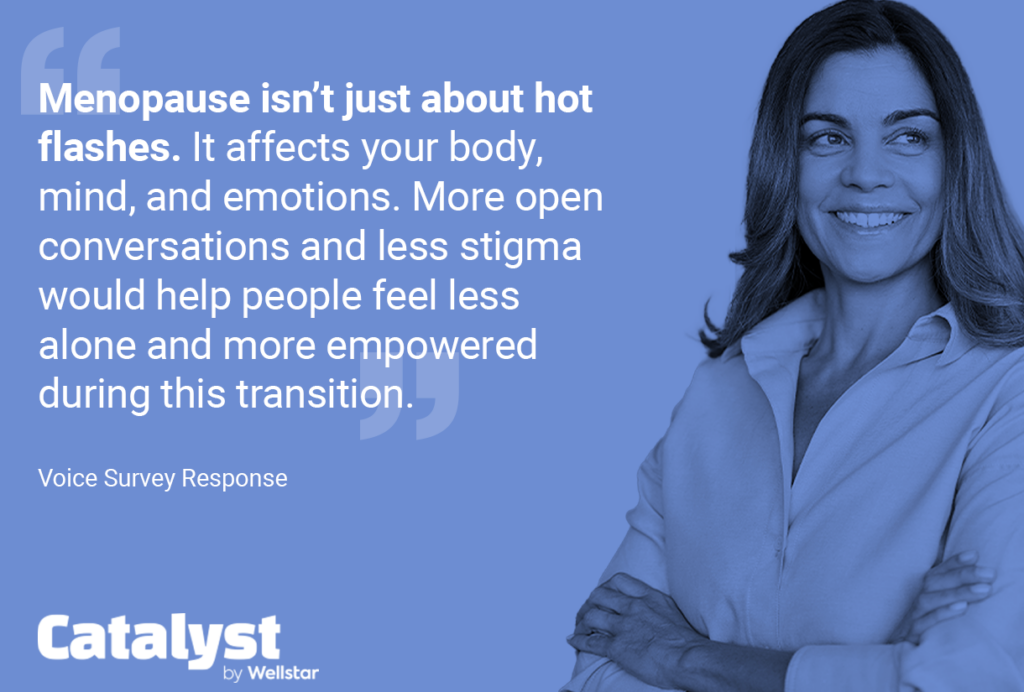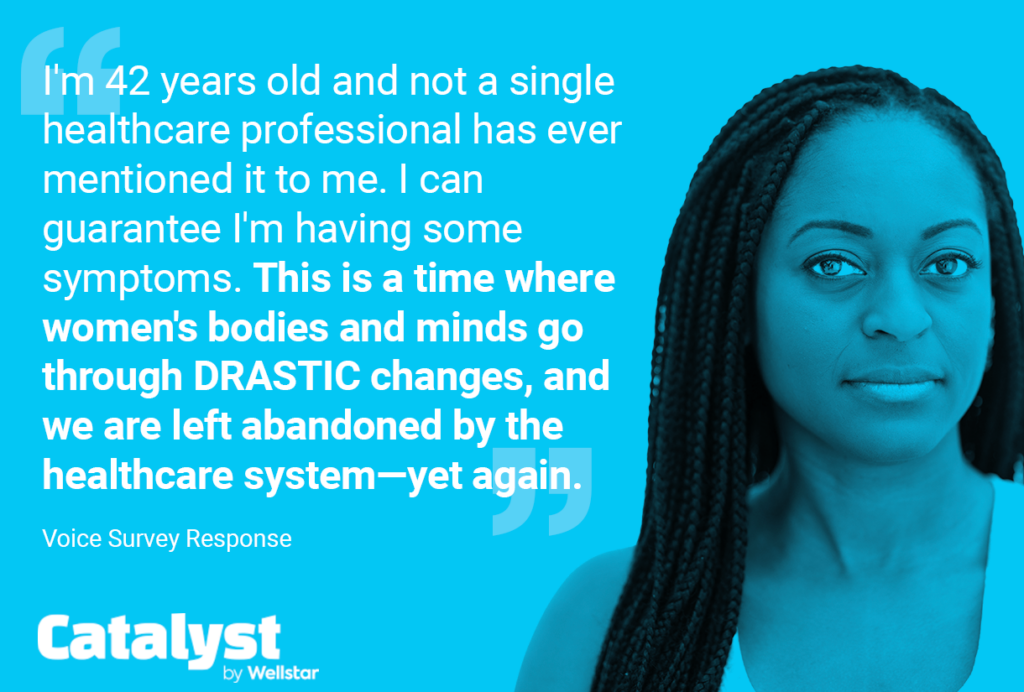
What happens when you ask hundreds of people—men and women alike—about menopause? You get a wake-up call.
In April 2025, Catalyst by Wellstar conducted one of the largest menopause surveys of its kind: “Menopause: Women can’t escape it. Society avoids it. Men underestimate it. And doctors ignore it.”
With input from nearly 1,700 Wellstar patients, the findings exposed not just a healthcare gap—but a cultural one.
We wanted to better understand menopause—not just through the eyes of women experiencing it, but also through the lens of those who love, live, and work alongside them.
What we learned was powerful, sobering, and deeply human. And perhaps most importantly, it made one thing crystal clear: we all have a role to play in rewriting the menopause story.
Why Did We Do This Survey?
Menopause is a natural life stage that affects over half the population. And yet, it remains cloaked in stigma, silence, and misinformation—even in healthcare settings. Especially in workplaces.
Our goal wasn’t just to collect responses—it was to spark a long-overdue conversation. One that goes beyond hot flashes to acknowledge the physical, emotional, social, and relational impact of this transition. And to begin exploring what real support can—and should—look like.
The Invisible Struggle: What Women Told Us
Let’s start with the numbers:

These gaps aren’t just academic. They’re deeply personal.

Symptoms like sleep disruption, memory fog, and joint pain are common, yet often ignored or minimized. Many women described feeling dismissed or completely abandoned by the healthcare system.
“I’m 42 years old and not a single healthcare professional has ever mentioned it to me. I can guarantee I’m having some symptoms. This is a time where women’s bodies and minds go through DRASTIC changes, and we are left abandoned by the healthcare system—yet again,” another female respondent wrote.
Men Want to Help. They Just Don’t Know How
While women feel unheard, men often feel unprepared. Only 55% of men said they felt “somewhat knowledgeable” about menopause—yet 90% agreed they should understand it better.
And here’s the hopeful part: many men want to learn. They’re looking for guidance and resources so they can better support their partners, friends, and family members.
“Men need help with how to support women… Some of the worst physical and mental issues hang on a long time and take adjusting to on both the woman’s and significant other’s parts, said a male Voice member.
Yet they, too, are up against cultural silence and lack of education. Our survey included customized questions for men and women, helping us uncover not just the gaps but the potential for change.
Why This Matters for Everyone
While menopause directly affects women, everyone feels its ripples. It influences relationships, sleep, career trajectories, mental health, and family dynamics. And too often, it’s left out of clinical care, public discourse, and social support structures.
“The more we see it and talk about it, the less stigma there is… My husband is happy to support me; we just have to educate him, and I don’t really know what resources there are that can help with that,” said a female Voice member.
We’ve made some strides in educating about perimenopause and menopause, but the awareness gap is still large, especially for men. Even many women told us they felt uninformed, unprepared, and unsupported by their doctors.
What’s the Solution?
It starts with talking about it. When we normalize conversations about menopause, we reduce stigma and create space for women to feel seen, heard, and supported.
Clinicians need to do more than treat symptoms. They need tools, time, and training to bring menopause into routine care. Many women in our survey said their doctors never even mentioned it despite clear symptoms. That has to change.
Support also means going beyond the clinic. Women are looking for connection: community, emotional support, and digital tools that are easy to use, personalized, and ideally covered by insurance. Over 70% told us they’d use one.
And men? They want to help; they just don’t know how. With better education, they can become allies instead of observers.
The bottom line? Menopause touches every corner of life. That means every part of the system—healthcare, families, workplaces—has to show up differently. More empathy. More education. More options. More dignity.
And it begins by believing that women deserve better. Because they do.

Catalyst by Wellstar backs Elektra Health to bring menopause care out of the shadows and into the 21st century—where it belongs.
Elektra is rewriting the menopause story with virtual, evidence-based care that meets women at home, at work, and through a reimagined healthcare experience.